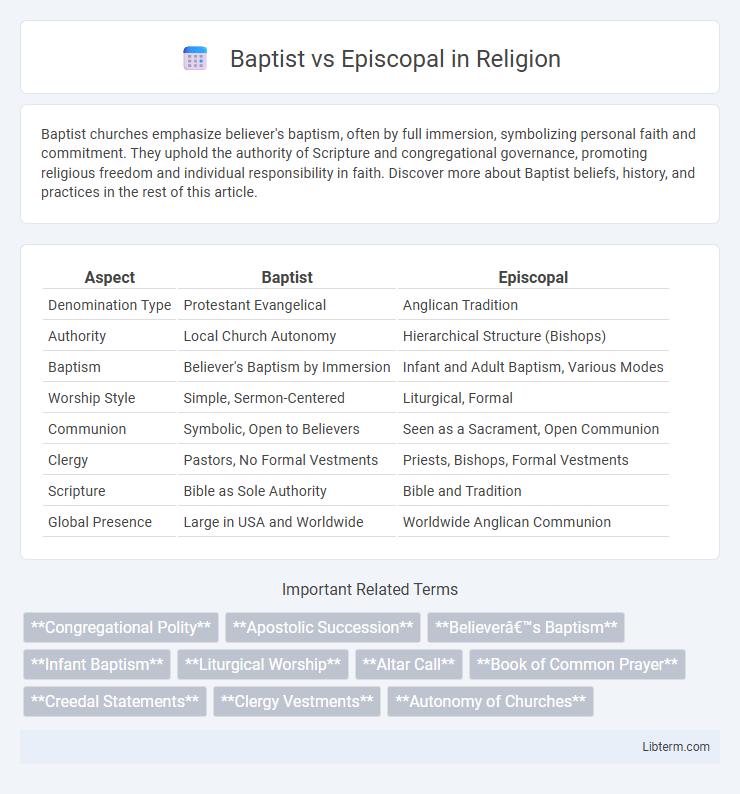Baptist churches emphasize believer's baptism, often by full immersion, symbolizing personal faith and commitment. They uphold the authority of Scripture and congregational governance, promoting religious freedom and individual responsibility in faith. Discover more about Baptist beliefs, history, and practices in the rest of this article.
Table of Comparison
| Aspect | Baptist | Episcopal |
|---|---|---|
| Denomination Type | Protestant Evangelical | Anglican Tradition |
| Authority | Local Church Autonomy | Hierarchical Structure (Bishops) |
| Baptism | Believer's Baptism by Immersion | Infant and Adult Baptism, Various Modes |
| Worship Style | Simple, Sermon-Centered | Liturgical, Formal |
| Communion | Symbolic, Open to Believers | Seen as a Sacrament, Open Communion |
| Clergy | Pastors, No Formal Vestments | Priests, Bishops, Formal Vestments |
| Scripture | Bible as Sole Authority | Bible and Tradition |
| Global Presence | Large in USA and Worldwide | Worldwide Anglican Communion |
Origins and Historical Background
Baptist churches originated in the early 17th century amid English Separatist movements emphasizing believers' baptism and congregational governance, tracing their roots to English Puritanism and Radical Reformation influences. The Episcopal Church, evolving from the Church of England during the 16th-century English Reformation, maintains an episcopal polity with bishops and a liturgical tradition deeply tied to Anglicanism. Both denominations reflect distinct historical trajectories: Baptists advocating for congregational autonomy and believer's baptism, and Episcopalians upholding apostolic succession and hierarchical structure.
Core Beliefs and Doctrines
Baptists emphasize believer's baptism by full immersion, the authority of Scripture alone (sola scriptura), and the autonomy of the local church, rejecting infant baptism and hierarchical structures. Episcopalians uphold a liturgical tradition rooted in the Book of Common Prayer, accept infant baptism, and maintain apostolic succession through bishops, blending Protestant theology with elements of Catholicism. Core doctrinal differences include Baptists' focus on individual faith profession for salvation and Episcopalians' emphasis on sacraments as means of grace within a historic episcopal polity.
Structure and Governance
Baptist churches operate with congregational governance, emphasizing local church autonomy where each congregation independently manages its affairs and leadership. Episcopal churches follow a hierarchical structure led by bishops, with authority centralized in regional and national church bodies that oversee doctrine and clergy appointments. The Episcopal system maintains a formalized chain of command, contrasting with the Baptist model's decentralized decision-making process.
Worship Practices and Liturgy
Baptist worship practices emphasize simplicity, often featuring spontaneous prayers, congregational singing, and expository preaching without formal liturgy. In contrast, Episcopal worship follows a structured liturgy based on the Book of Common Prayer, incorporating rituals like the Eucharist, vestments, and set prayers. The Episcopal Church prioritizes sacramental worship and formal ceremonies, while Baptist services center on personal conversion and scriptural teaching.
Baptism: Differences in Belief and Practice
Baptists emphasize believer's baptism by full immersion, viewing it as an outward profession of personal faith and a prerequisite for church membership, while rejecting infant baptism. Episcopalians practice both infant and adult baptism, often by sprinkling or pouring, considering baptism a sacrament that initiates an individual into the covenant community regardless of personal belief at the time. The theological divergence centers on the meaning and timing of baptism, with Baptists stressing conscious repentance and Episcopalians emphasizing covenantal inclusion and sacramental grace.
Views on Scripture and Authority
Baptists uphold the Bible as the sole authority in matters of faith and practice, emphasizing scriptural inerrancy and individual interpretation guided by the Holy Spirit. Episcopalians respect the Bible as foundational but also incorporate church tradition, reason, and episcopal authority in theological decisions, reflecting a more hierarchical structure. This divergence results in Baptists prioritizing personal Bible study and congregational autonomy, while Episcopalians value a balanced approach involving clergy leadership and historical doctrine.
Role of Clergy and Leadership
Baptist churches emphasize congregational leadership, where pastors serve primarily as teachers and spiritual guides without hierarchical authority over the congregation. Episcopal churches operate under a hierarchical structure led by bishops who govern multiple congregations, with priests and deacons serving specific liturgical and pastoral roles. The Episcopal clergy maintain apostolic succession, which is absent in Baptist traditions, reflecting distinct theological views on church authority and governance.
Social Issues and Modern Stances
Baptist churches generally emphasize individual conscience and autonomous congregations, leading to diverse views on social issues such as LGBTQ+ inclusion and women's leadership, with many Baptist groups maintaining traditional stances while others adopt progressive approaches. Episcopal churches, part of the Anglican Communion, often advocate for social justice, gender equality, and LGBTQ+ rights, reflecting a broader acceptance of modern cultural changes within their liturgy and governance. The Episcopal Church actively supports ordained women and openly LGBTQ+ clergy, aligning its theology with contemporary social activism more consistently than many Baptist denominations.
Community Life and Church Membership
Baptist churches emphasize individual profession of faith and believer's baptism as the basis for church membership, fostering a community life centered on personal conversion and active lay participation. Episcopal churches maintain a more structured membership system through infant baptism, confirmation, and formal inclusion in the parish community, promoting communal worship and sacramental participation. Both traditions value fellowship and service, but Baptists prioritize autonomous local church governance while Episcopalians emphasize connectionalism within the wider Anglican Communion.
Global Presence and Influence
The Baptist denomination, with approximately 100 million adherents worldwide, has a strong presence in the United States, Brazil, and parts of Africa, emphasizing local church autonomy and evangelical outreach. The Episcopal Church, part of the global Anglican Communion with about 85 million members, maintains significant influence in the United Kingdom, the United States, and former British colonies, known for its liturgical tradition and hierarchical structure. Both denominations exert considerable cultural and social influence through extensive missionary work, educational institutions, and community services in diverse regions.
Baptist Infographic

 libterm.com
libterm.com